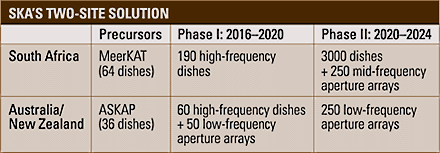|
News & Views item - September 2012 |
![]() A Plea for the US to Rejoin Support for the SKA.
(September 21, 2012)
A Plea for the US to Rejoin Support for the SKA.
(September 21, 2012)
Anthony J. Beasley & Ethan J. Schreier, director of the National Radio Astronomy Observatory and president of Associated Universities Incorporated respectively, in a comment piece contributed to the September 20, 2012 issue of Nature write that "The United States must rejoin the SKA" (Square Kilometre Array); its absence threatens to hinder the SKA's pursuit of its scientific goals".
 The
promise of the SKA should its design prospects be fully implemented "will
observe diffuse hydrogen ionized by the first stars and galaxies, use pulsars to
explore general relativity, and detect the imprints of dark energy on the
distribution of matter in the Universe". However, last year the United States
resigned from the supporting consortium citing "disillusionment with the
project's planning process and budget pressure from the National Science
Foundation (NSF)". In essence it was determined that the SKA proposal was a
poorly presented "business plan".
The
promise of the SKA should its design prospects be fully implemented "will
observe diffuse hydrogen ionized by the first stars and galaxies, use pulsars to
explore general relativity, and detect the imprints of dark energy on the
distribution of matter in the Universe". However, last year the United States
resigned from the supporting consortium citing "disillusionment with the
project's planning process and budget pressure from the National Science
Foundation (NSF)". In essence it was determined that the SKA proposal was a
poorly presented "business plan".
In the opinion of the authors the absence of US participation will "without US scientific and technical input, and the ability to test SKA technologies at our facilities, the array's development will be slowed down by many years".
And in fact Beasley and Schreier agree that the proposal as presented lacked sufficient detail: "Satisfying all the telescope's ambitious goals will require several different types of technology (such as receiving dishes, dipoles and tiles) and the consortium has yet to decide how to adapt and integrate them," but add that in their view, "Participation of US astronomers will be crucial in the firming up of those plans."
As caveats Beasley and Schreier note that within a year or two project director-general "Phil Diamond and the consortium... should clearly define the technology developments necessary for a realizable instrument. This will be tricky because the ambitious goals of the SKA hinge on continual 'Moore's law' improvements in digital technologies... Components available now will be obsolete by the time the telescope comes online, so a gradual updating process needs to be worked into the plan".